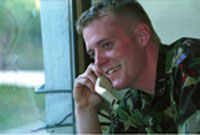Hotline for wounded servicemen wide-ranges discussion issues
Every day for weeks on end, injured Army pilot Joseph Luciano talked to an answering machine at Walter Reed hospital, trying to get an appointment for a heart scan.

Then he called the Army's new Wounded Soldier and Family Hotline. Within six hours, he got the appointment - along with an apology from the colonel who heads Walter Reed Army Medical Center's radiology department.
The hotline has logged more than 3,500 calls since it was set up three months ago following revelations that Walter Reed outpatients were languishing in shoddy housing and suffering bureaucratic delays in getting additional care, evaluations and compensation for wounds, mental problems and other health issues.
"It's totally needed," Luciano, a 59-year-old Army National Guard Black Hawk helicopter pilot said of the hotline. "There are ... plenty of soldiers who just don't know which way to turn when they've run into a frustrating problem."
The hotline is manned 24 hours a day, every day, by 100 employees on three shifts.
They aim to get an answer for every caller within three business days - not solving the problem themselves, but channeling it to the person or agency that can. The operation essentially cuts through red tape like no average caller could.
"We cut through it and get (the request) in the proper hands so people understand there is a sense of urgency," said Col. Robert Clark, deputy director of the call center. "When a soldier calls us, he may have tried other avenues and not gotten an answer. So we attach a sense of urgency to everything we do."
Callers have included soldiers, their relatives, veterans and members of other services. They call about missing records, questions over treatment, requests for surgery and help with the complicated evaluation process that judges their ability to continue in service and decides disability payments.
Though the hotline program was planned as a medical help line - and more than half of calls are on that subject - the issues are wide ranging. Callers want financial counseling, help finding a lawyer or to know why they didn't get a promotion or award they think they earned in their time overseas.
Some want simple information like phone numbers to call, directions to the hospital or Web sites to consult.
One soldier noticed money was being subtracted from his pay and wanted to know why. The call center tracked it down as deductions for an old student loan.
Callers are "going to get an answer," Clark said, though it may not be the one they want.
It is one piece in a broad effort the Army has scrambled to make across its health system since problems at Walter Reed surfaced in February.
In March, President George W. Bush ordered creation of a presidential commission to investigate care given to wounded troops and apologized to some of them in person during a visit to Walter Reed. He was to visit the hospital again on Tuesday.
A panel of Army officials reported to Congress last week on what progress has been made to upgrade military hospital care. They said work has been done toward repairing buildings, increasing funding, hiring more psychiatrists and other staff, improving training, mobilizing lawyers and assigning new teams to advocate for troops and their families.
Overall, the military's health system was unprepared for the unexpectedly high number of casualties in Iraq. Some 26,000 service members have suffered battle-related injuries and thousands more have been injured in accidents. They are treated at different facilities, and Walter Reed says it has received nearly 6,000 from Iraq and more than 500 from Afghanistan.
The Iraq campaign has lasted much longer than expected and many troops are suffering head trauma, mental stress symptoms, amputations and burns from roadside bombings.
"Our nation cannot ask our soldiers and their families to make these sacrifices and ... then endure an under-resourced or bureaucratic system when they get home," Army Vice Chief of Staff Gen. Richard A. Cody told lawmakers. "We ... are committed to getting this right."
Luciano, a warrant officer, was injured while in Kosovo as a medical evacuation helicopter pilot and battle captain with the First Battalion, 104th Aviation (attack helicopter), 28th Division, Pennsylvania Army National Guard. He suffered a hernia, displaced vertebra and elbow injury last November when troops were working at a local school where children were playing and a lumber pile began to collapse.
He had surgery and physical therapy but needed a heart scan to be cleared for flying. The appointment was impossible to get, he said.
"I started trying ... at the end of March," Luciano said. "I'd call every day ... for several weeks."
When the hotline interceded in late April, he says, he got a call from the radiology department's Col. Michael Brazaitis, who told Luciano he was sorry for the problem and personally set up the appointment for the following day.
Subscribe to Pravda.Ru Telegram channel, Facebook, RSS!


